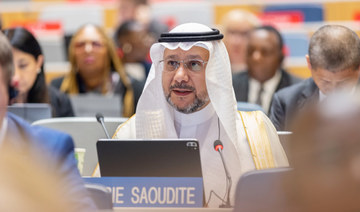RIYADH: Saudi Arabia handled the coronavirus disease (COVID-19) pandemic from the get-go, taking timely and cautious measures to ensure the safety of citizens, residents and illegal migrants alike.
“Saudi Arabia acted, not reacted, to the pandemic,” said Dr. Reem bint Mansour Al-Saud, member of the Kingdom’s permanent delegation to the UN in New York.
While quarantining in New York due to her responsibilities in the UN, Dr. Reem bint Mansour Al-Saud spoke to Arab News about COVID-19 and the way Saudi Arabia has addressed the crisis.
“There were combined efforts from multiple government entities to test, treat and contain — all essential elements in coping with pandemics,” Dr Reem said.
“The Ministry of Health is stepping up efforts in testing and in the provision of treatments for those in need. Provinces and municipalities are doing their part to contain the spread of the virus while also providing basic needs,” she added.
“The Ministry of Finance is pumping funds to boost the economy and support local businesses.”
She said that the Kingdom has several policies in place that fulfill its commitments towards the Sustainable Development Goals (SDG) in the healthcare sector.
The third SDG stipulates the promotion of well-being for all by ensuring universal health coverage, financial risk protection and access to essential health services.
“The Kingdom already provides free healthcare for all its citizens, which is an important element in a strong healthcare infrastructure, necessary to weather this pandemic,” Dr. Reem said. “Moreover, the gender gap in the sector is minimal, ensuring that everyone has equal access to proper health care.”
Saudi Arabia has co-sponsored a UN General Assembly resolution recently adopted by all member states.
“In the spirit of multilateralism, Saudi Arabia has donated $10 million to the World Health Organization to step up international support, in addition to leading the G20 combined pledge of $5 trillion,” Dr Reem said.
BIO
Dr. Reem bint Mansour Al-Saud holds a master’s degree in social policy and a Ph.D. in Middle Eastern studies, both from Oxford University.
She is a post-doctoral research fellow at Harvard’s Kennedy School of Government to work on enhancing Saudi labor policies, especially those concerned with women.
The COVID-19 pandemic is not the first health crisis that Saudi Arabia has had to contend with. In 2012, the Kingdom saw the outbreak of the Middle East Respiratory Syndrome (MERS).
“A strong healthcare infrastructure and the implementation of a strict code of conduct guidelines are essential to contain the virus,” Dr. Reem said. “Lessons were learned from the MERS outbreak, as well as how to manage millions of pilgrims during hajj and umrah, where the prevalence of respiratory illnesses ranges between 50-90 percent of pilgrims. This is why strict measures had to be taken to contain this virus as well.”
Dr. Reem works at the Saudi UN mission as a Sustainable Development Expert. In 2015, she negotiated the 2030 agenda for Sustainable Development on behalf of Saudi Arabia when it was adopted in 2015.
Saudi Arabia’s agenda includes 17 SDGs, including social, economic and environmental goals “meant to eliminate poverty and build resilient societies to create a more prosperous planet.”
The importance of such an agenda is becoming ever more prevalent as member states work collectively to support the containment and recovery from the COVID-19 pandemic.
Dr. Reem highlighted the important role of women, who comprise the majority of caregivers, in combating the global crisis in healthcare and social sectors.
“Women and men around the world are working at the frontlines in the battle against COVID-19. But women represent 70 percent of the workforce in healthcare and social sectors, according to the WHO,” Dr Reem said. “The majority of caregivers are women. They are more at risk of infection yet they are putting their lives on the line to save us.”
She explained that the global informal economy is “dominated” by women.
“This means that women are less likely have access to healthcare and a stable income to sustain a decent living standard. They are thus more at risk from the virus in several ways. Recovering economically from this pandemic may take more time for women in this sector. So, they are disproportionally disadvantaged by crises,” Dr Reem said.
“The health gender gap in Saudi Arabia is minimal, fortunately. Everyone has equal access to healthcare. This is why it is important to have resilient infrastructures that support the livelihood of all people and allow them to bounce back.”
Dr. Reem said that empowerment comes when there are enabling environments that support individual autonomy and development, which eventually lead to collective development.
Empowerment, she explained, cannot be fully realized without the space for autonomous growth that is not contingent on other individuals, but rather on systems and infrastructures that enable it.
“To think that empowerment is granted from one individual to another is the essence of disempowerment because it inherently means that there is a personal hierarchal dependency,” Dr. Reem said.
She added: “In line with Vision 2030, many social and economic policies have been adopted in Saudi Arabia that allow women to be agents of change and self-empowerment, including equal work opportunities and pay, driving and travel. One cannot underestimate the value that women bring to the workforce to foster sustainable economic growth.”




























